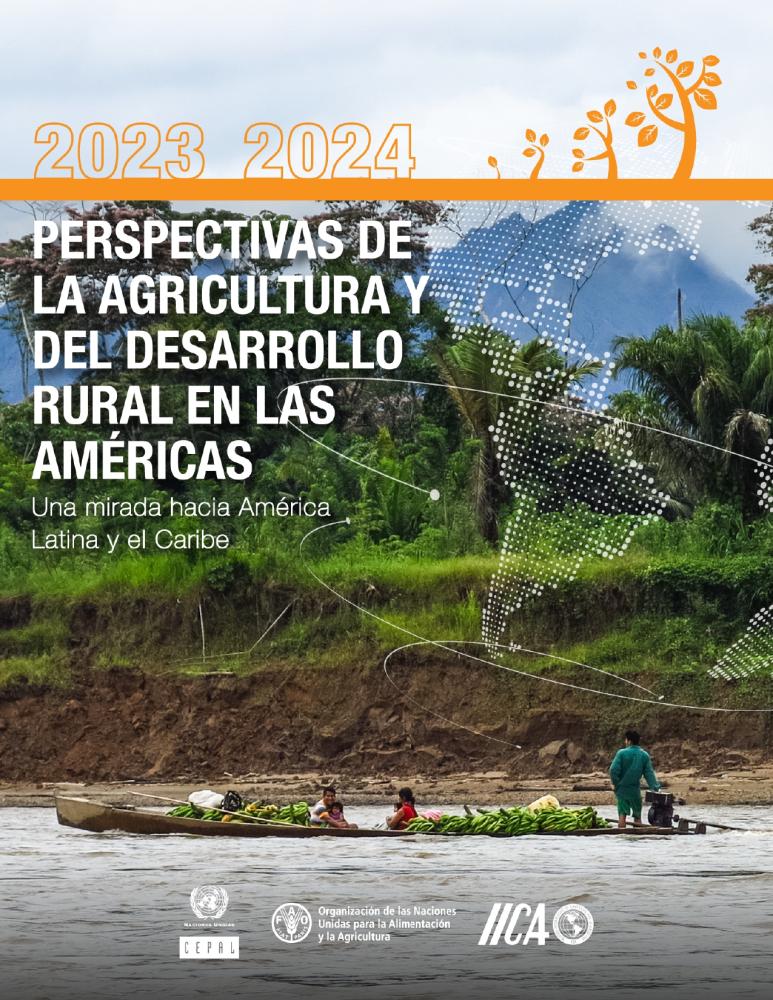Así lo señala el informe de Perspectivas de la Agricultura y del desarrollo rural en las Américas 2023-2024, elaborado por las tres instituciones y que se presentó en Costa Rica durante la Conferencia de Ministros de Agricultura del hemisferio.

San José, 6 de octubre, 2023 (IICA). Fortalecer la cooperación regional hoy se torna imprescindible para hacer frente a los desafíos y las oportunidades que surgen de las crisis convergentes en el contexto mundial actual, y para poder impulsar en América Latina y el Caribe (ALC) sistemas agroalimentarios sostenibles, inclusivos y resilientes.
Así lo recalca la nueva edición del informe Perspectivas de la agricultura y del desarrollo rural en las Américas: una mirada hacia América Latina y el Caribe 2023-2024, elaborado por la Comisión Económica para América Latina y el Caribe (CEPAL), la Organización de las Naciones Unidas para la Alimentación y la Agricultura (FAO) y el Instituto Interamericano de Cooperación para la Agricultura (IICA).
El documento se presentó en la Conferencia de Ministros de Agricultura de las Américas 2023, que se llevó a cabo en San José, Costa Rica, del 3 al 5 de octubre. Subraya que conflictos bélicos como el persistente entre Rusia y Ucrania, la crisis climática, el alto costo y la reducida disponibilidad de fertilizantes desde el 2021, y la necesidad de alimentar de forma sostenible a una población en constante crecimiento y con menos recursos naturales disponibles, han puesto a prueba la resiliencia de los sistemas agroalimentarios en la región.
El informe hace hincapié en que la cooperación regional adquiere una vital importancia y la colaboración entre países se convierte en un pilar para aprovechar las nuevas oportunidades de desarrollo sostenible e inclusivo, y de lograr mayor resiliencia de los sistemas agroalimentarios.
“Ante los desafíos y las oportunidades actuales para los sistemas agroalimentarios de las Américas, que están al tope de la agenda global, es imprescindible la cooperación regional enfocada en construir soluciones a través del desarrollo agropecuario y rural sostenible, en posicionar al sector y a las Américas en las agendas globales, y en jerarquizar a los territorios rurales como activos estratégicos para la seguridad alimentaria y nutricional y la sostenibilidad ambiental del mundo. En el IICA estamos comprometidos en avanzar hacia esa dirección”, aseguró su Director General, Manuel Otero.
“La cooperación multisectorial es esencial para abordar la pobreza y el hambre en América Latina y el Caribe. La región podría convertirse en un referente de gobernanza regional, cooperación Sur-Sur e integración, mediante acciones innovadoras para lograr sistemas agroalimentarios más eficientes, inclusivos, resilientes y sostenibles. La FAO, junto con el IICA y la CEPAL, continuará apoyando los esfuerzos nacionales y regionales para lograr un crecimiento sostenible y equitativo en la región” señaló Mario Lubetkin, Subdirector General y Representante Regional de la FAO para América Latina y el Caribe.
El documento plantea que modalidades de cooperación como la triangular, la Sur-Sur, y la Norte-Sur han sido fundamentales para mejorar las condiciones rurales en ALC y buscar soluciones colectivas que impulsen la sostenibilidad de los sistemas agroalimentarios, y que ayuden a superar brechas productivas, económicas, ambientales y sociales.
La publicación insta a mejorar los mecanismos de integración e institucionales existentes en las Américas, lo cual exige una gobernanza sólida, para orientar mejor las decisiones, coordinar esfuerzos y posicionar las prioridades de la región en los foros globales, reforzando así la influencia de ALC en la comunidad internacional.
Para fortalecer la cooperación regional, la CEPAL, la FAO y el IICA señalan que es necesaria una producción agropecuaria sostenible en un contexto de cambio ambiental global, que promueva enfoques, prácticas y tecnologías agrícolas innovadoras y sostenibles y que abarque temas como la restauración del paisaje productivo, la gestión integrada de la tierra y el agua, la erosión hídrica, la tenencia de la tierra y la acción climática, entre otros.
“Es indispensable el desarrollo de la bioeconomía como estrategia de diversificación productiva y agregación de valor en la agricultura; la aplicación del enfoque Una Salud; la inclusión social y económica con igualdad de género en el sector agropecuario y rural; y potenciar el comercio agroalimentario de ALC como motor del desarrollo económico, la seguridad alimentaria y la sostenibilidad regional y global”, señaló José Manuel Salazar-Xirinachs, Secretario Ejecutivo de la CEPAL.
El informe explora también acciones que tienen el potencial de habilitar o acelerar la transformación de los sistemas agroalimentarios, entre ellas la transición energética, orientada a reducir los gases de efecto invernadero (GEI) en diversos sectores económicos, y en la que un pilar fundamental es la descarbonización del sector transporte. En este ámbito, los biocombustibles líquidos emergen como actores claves para alternativas ambientalmente sostenibles y económicamente factibles, con el agro como principal proveedor de materias primas para la producción sostenible de biocombustibles.
Otras de las acciones que esboza la publicación son las vinculadas con las tecnologías digitales determinantes en la evolución hacia sistemas agroalimentarios más sostenibles, porque permiten una gestión informada y precisa de los procesos agroalimentarios, e impulsan una mayor producción, al hacer más eficientes el uso de insumos y recursos naturales. También aumentan la provisión de servicios ecosistémicos.
De igual forma, el informe resalta la importancia de las plataformas de conocimiento para fomentar la cooperación regional en los sistemas agroalimentarios en áreas diversas, desde investigaciones científicas y prácticas comunitarias, hasta tendencias tecnológicas y regulaciones gubernamentales. Estas plataformas facilitan decisiones informadas y una comprensión integral de los desafíos ambientales, económicos y sociales que enfrentan tales sistemas.
Agro regional: estabilizador de los mercados
El informe destaca el contexto de estancamiento en que se encuentra la región. El crecimiento promedio regional que se proyecta para 2023 es de 1,7%, mientras que para 2024 se espera un crecimiento de 1, 5%.
Este bajo crecimiento regional puede verse agravado por los efectos negativos de una agudización de los choques climáticos, si no se realizan las inversiones en adaptación y mitigación al cambio climático que requiere la región, sobre todo en la agricultura y en los sistemas agroalimentarios.
Pese a la reducción de la inflación a nivel global, es probable que los países desarrollados sigan con sus políticas monetarias contractivas, las cuales a su vez tienden a aumentar la deuda pública de los países de la región y limitar el espacio de política fiscal.
El documento ahonda en que fortalecer la cooperación regional es crucial para paliar una realidad que las crisis alimentaria, energética y financiera están agudizando. De acuerdo con la publicación, estas crisis están empujando a más personas a la pobreza extrema y al hambre, lo que ha llevado a un retroceso de más de 15 años hasta los niveles observados en 2005.
Los datos del informe indican que 43,2 millones de personas en ALC, un 6,5% de la población, padecen hambre, y 201 millones de personas (32,1%) viven en situación de pobreza. Se revela también que el 21,2% de la población en las zonas rurales experimentó pobreza extrema en 2022, comparado con el 10,9% en las zonas urbanas.
La publicación destaca la resiliencia que ha mostrado el sector durante las crisis recientes. A pesar de ellas, las exportaciones agroalimentarias de ALC crecieron a tasas que superaron 2,6 veces el crecimiento mundial de 2020 y 1,7 veces el de 2022. Se enfatiza que, en los últimos años, la balanza comercial nominal agroalimentaria de ALC (17 países) experimentó incrementos significativos en comparación con el año anterior: un aumento de 4,3% en 2020, de 16,6% en 2021 y de 22,3% en 2022. La balanza comercial pasó de USD 155 600 millones en 2019 a USD 231 400 millones en 2022.
El informe deja ver que en efecto la agricultura regional ha desempeñado un papel importante como estabilizador de los mercados; de lo contrario los impactos negativos de las crisis podrían haber sido mucho más intensos. Ese papel estratégico se explica en parte por el hecho de que la agricultura regional representa aproximadamente el 22% de las exportaciones de mercancías, alrededor del 5% del PIB y da empleo al 15% de la población.
Además, la región se posiciona como la principal exportadora neta de alimentos en el ámbito global, con el potencial de alimentar a millones de personas cada año.
Más información:
Gerencia de Comunicación Institucional del IICA.
comunicacion.institucional@iica.int
Unidad de Información Pública de la CEPAL.
prensa@cepal.org
Ricardo Aníbal Rivera Gallardo, Comunicador de FAO para América Latina y el Caribe.
Ricardo.Rivera@fao.org










